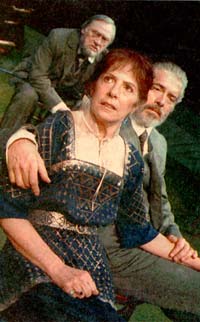|
Loading
|
|
|

A sensitive 'Seagull' lands at the Barbican
Sarah Hemming, Financial Times, April 28, 2000
The Seagull Barbican, London EC2
There is a wonderful moment at the heart of Adrian Noble's fine RSC production of The Seagull. The assembled company sitting by the lake on Sorin's estate hears music drifting over from the opposite bank. Gradually they all start to hum and sway to the old Russian tune, becoming lost in their thoughts as they do so. Beautifully carried off, this short wordless interlude seems to pinpoint the bittersweet nature of the play: the characters look like figures in an old sepia photograph, suspended briefly from the agitation of their daily lives. It sums up too all that is good about the production, which artlessly catches the rueful blend of comedy and tragedy that makes Chekhov such a humane writer. And it pulls the audience into the characters' experience.
This last point is another great strength of the production: you feel as if you had really happened upon these characters in the middle of their lives. Noble gives the play (translated unobtrusively by Peter Gill) a gentle rhythm; allows it to breathe. But this quiet pace also presents problems, which perhaps have partly to do with the space. This production originated in Stratford's intimate Swan Theatre; transferred to the proscenium stage of the Barbican, it seems to need more thrust to get it over the footlights. As it is, it dawdles somewhat.
This does not detract too much, however, from the wisdom of the production, the wealth of sensitive detail, or the fact that it contains many excellent performances and much fine ensemble acting. That same wordless interlude also reinforces how lonely many of the characters are, and while the production is often very funny, it also lets you see their vulnerability and desperation. This is very true of Penelope Wilton's subtle performance as Arkadina, the actress at the heart of the play. While she can be superbly catty (witness her treatment of Nina) and supremely self-centred, she can also be tender (witness the scene when she bandages Konstantin's head) and vulnerable. When she tries to woo Trigorin back to her from Nina, we see an actress who is playing for her life, an ageing woman whose best bet now is this mediocre novelist. We see him, meanwhile, prolong their kiss to give him time to yank his notebook out of his pocket.
There are interesting performances here. John Light plays Konstantin as the blueprint for the angry young man, both absurd and touching as he clumsily paces the stage in overwrought anguish. Justine Waddell's Nina looks enchanting, but she, unlike Konstantin, is clearly a survivor, and her histrionics in the final scene have the whiff of an act about them. Niamh Linehan as Masha is delightfully eccentric, swigging vodka and swooning at will, a woman almost in love with her own misfortune. The price of romanticism is high for all of them.
Nigel Terry is oddly cast as Trigorin, playing him much older than usual (crucially, older than Arkadina), and giving a rather mannered, blustering performance. But there is a lovely, understated performance from Richard Johnson as Dr Dorn, and an excellent one from Richard Pasco as Sorin. Pasco brings great warmth to this comic old buffer, who is dying a slow death from disappointment. While others around him have grand, artistic ambitions, his hopes are so modest that the dashing of them is terribly poignant, and he brings this out most touchingly. This is Chekhov, through and through.